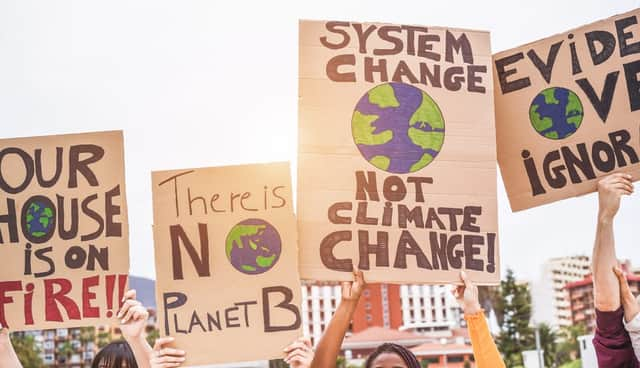Facebook is cracking down on climate misinformation in the UK - these are the biggest environment myths debunked


Facebook has pledged to start labelling some posts as misinformation, if they contain myths or highly disputed claims about climate change.
The social network is launching a limited trial in the UK, working with climate experts and its Climate Science Information Centre, to label some content on their platform.
Advertisement
Hide AdAdvertisement
Hide AdIt is not yet clear what form the trial will take, although it is thought the process will be similar to that used in the US election.
Climate misinformation tends to deny the existence of climate change, or reject the idea that human activity impacts climate change.
Here are a few common myths about the climate debunked.
Myth: Excess carbon emissions help plant life
Facebook’s Climate Science Information Centre lists a number of climate change facts which are designed to combat common myths or misconceptions.
Some climate sceptics argue that we shouldn’t reduce carbon emissions because increased levels of carbon dioxide (CO2) can, in some instances, have a positive effect on fertilisation, as plants do need some CO2 to survive.
Advertisement
Hide AdAdvertisement
Hide AdIn a post attributed to Yale School of the Environment, it states: “The myth that extra CO2 is universally good for plants assumes that plants need CO2 alone for food and ignore everything else that they need to flourish.
“CO2 emissions from human activities cause the climate to change, intensifying heatwaves, floods and droughts. These factors all disrupt the water supply and other conditions that foster healthy plant growth.”
Myth: Polar bear populations are not suffering
One increasingly common myth about the impacts of climate change is that, despite the portrayal of polar bears as being at risk because of melting ice caps, their population numbers are actually increasing.
In terms of numbers, polar bear populations are expected to decline by 30 per cent over the next three decades as a result of habitat loss. And while the numbers of polar bears in a few regions are stable or increasing slightly, many places are already seeing a decline.
Advertisement
Hide AdAdvertisement
Hide AdBut even if polar bears weren’t affected by climate change, there’s still a huge body of evidence that shows many other species are being driven to extinction.
In fact, many scientists believe this loss of species is so severe that it should be categorised as a separate crisis to climate change, although the two are intrinsically linked.
Myth: Volcanic eruptions produce more CO2 than humans
A fairly common claim among those who deny or downplay the human contribution to climate change is that natural events, such as volcanic eruptions, actually contribute far more to carbon emissions than human activity.
But a report from the Intergovernmental Panel on Climate Change (IPCC) concludes that carbon dioxide emissions from volcanic eruptions since 1750 were at least 100 times less than fossil fuel emissions over the same period.
Advertisement
Hide AdAdvertisement
Hide AdVolcanic eruptions do impact climate in a short term sense, but they actually reduce atmospheric temperatures, rather than increase them. This is as a result of the ash clouds produced by the eruptions blocking the sunlight.
This cooling effect tends to last for around two years after a major eruption.